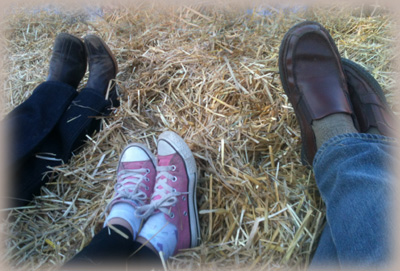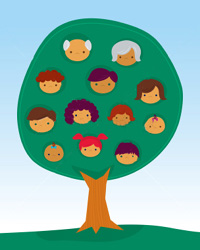Family Systems, Emotions & Behaviors
Want to change your kid's behavior? Do a little family investigation.

The family is a complex emotional system. It is our first social group. Our experiences within the boundaries of the family system determine how we come to view and respond to the world.
The family system lays the foundation for our patterns of behavior, our beliefs and how well we learn to process our emotions and relate to others.
The level of cooperation and consideration that you feel is a good measure of the level of connectedness within your family. Kids who display problem behaviors are either -
- Developmentally incapable
- Feel disconnected from the unit.
We depend on our family system for support, structure and protection. Our emotional systems (set up by the family patterns) affect virtually all of our behaviors and can lead us to positive pro-social thoughts and actions or in the reverse, a faulty emotional processing system can lead us to destructive patterns of withdrawing from others, displacing our anger and leaving us unable to manage conflict or change.
Emotions are fueled by needs and always manifest in our behaviors.
Our emotional processing system is responsible for managing the stress response system, allowing us to cope if we have the tools.
However, this processing system may need to be updated. Set up by an intricate set of rules, messages and roles passed down through the FAMILY, it may be that we are unconsciously abiding by unhealthy emotional and behavioral patterns that have been dictating our lives and relationships without our permission.
The Shock Absorber
Many times, one person in the family (often the sensitive one) will absorb much of the stress and anxiety felt by other members and then shoulder the responsibility for lessening it for the whole family.
Sometimes, that person is a child.
Family members are often unconscious, willingly participants in this imbalanced system. This pattern may reduce the pressure on other family members by keeping the 'system" in a twisted mode of functionality, but it is quite destructive to the overall health and well-being of the individuals and the family as a whole.
This person whom I call the "shock absorber," because s/he absorbs the tension in the family system, consciously or unconsciously changes his behavior to accommodate others. Until one day, when that person can no longer handle the weight of it all and the entire family comes crumbling down.
Families can be supportive or stressful.

A seeming harmony may reflect a great imbalance as individual family members struggle to maintain a toxic situation. Anxiety is contagious and in an interdependent group such as a family, it is spread infectiously from person to person.
How do we build a buffer to the stress of family dynamics that have been passed down from generation to generation?
Can we change it at all?
There are a few things you can do IF you are willing to look deeply at your habits, your family of origin and how you were parented, and even, how your parents were parented.
QUESTIONS TO ASK YOURSELF:
- What was it like growing up in my house? How did I feel most often?
- How were emotions viewed? Were they accepted, tolerated, or something to be ashamed of?
- How were emotions expressed? Openly, abusively or hidden from view and stuffed away?
- What unconscious beliefs am I holding from my family system? How do those beliefs interrupt the relationship I want to create with my child and/or loved ones?
- What is one thing I can do to strengthen my resilience and ease my stress so I can be more present for myself and my child?
There are predictable patterns that emerge from the early childhood and adolescent years. These patterns can grow to serve us into becoming confident, thinking, able, and resilient people or they can keep us locked in despair, struggle, misunderstanding, denial and depression if we don't consciously seek to repair the disconnections that we felt as children, which we are re-creating within our own families, today.
As adults, we may not be able to nor want to repair the disconnection we experienced with our parents but we can heal the separation from ourselves and thus reduce our anxiety, stress and relationship problems!!
HOW? Start by writing out your story! We all have a story to tell, and many of us are not aware of the profound impact that our earliest experiences and relationships had on our lives. Our stories are the stuff that makes us. What's your story? Want to change your kid's behavior? Do a little family investigation.
Understanding your child will come from understanding your past. If you don't know your story - you might not know what to change! Have you had some healing ah-ha moments?
Maybe your experiences with your children were the catalyst to your healing and motivation to change (they often are). If so, I want you to click on down to the comments and share your story!
I love hearing from you, so leave me a comment below. Share your stories, post your challenges and if you benefited from this article, consider sharing it with a friend!

comments powered by Disqus
